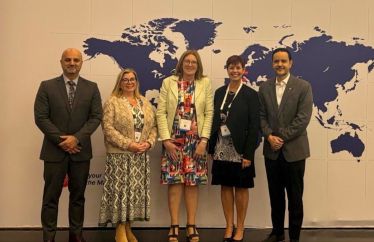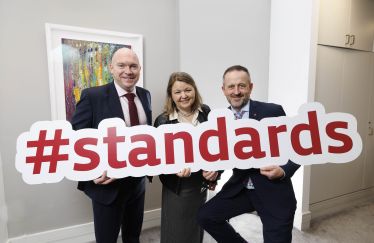Biotechnology is considered one of the key enabling technologies of the 21st century. Its work impacts and benefits many different sectors; such as medicine, agro-food, energy and the biotechnology production of chemicals. The research of today will become the new methods, medicines, treatments, and vaccines of the future.
In December 2013, The International Organisation for Standardization (ISO) established a Technical Committee, to develop the first ever international standards for the biotechnology industry. Best practice guidelines have already been established for various fields of biotechnology, but there are still no clear set of agreed internationally accepted standards.
The ISO Technical Committee for Biotechnology is made up of five working groups;
- Terminology,
- Biobanks and Bioresources,
- Analytical methods,
- Bioprocessing, and
- Data Processing and integration.
Biobank Manager at the INFANT Centre in University College Cork, Emma Snapes participates on Working Group 2, Biobanks and Bioresources. The INFANT Centre is Ireland’s first dedicated perinatal research centre.
“I’ve worked with a variety of biobank types, including microbiological, plant and clinical and provided advice to a number of national and overseas biobanks and scientists everywhere have the same similar concerns,” said Ms. Snapes.
“Are we doing things in the right way? Can we be doing things a little bit better? There are over 80 best practices guidelines. This leads to a very confusing area, particularly for new and emerging biobanks. Which guideline is best? How do we seek the right information for setting up and improving our processes for bio banking? By standardizing the mechanisms and introducing international benchmarks of excellence; research methodologies will become more rigorous, enhancing the quality of the research,” she added.
As a member of ISO, NSAI has established a mirror committee here in Ireland to help develop this new standard for the biotechnology industry. These new standards will facilitate technological development, contribute to regulations and support the exchange of goods and services through the elimination of technical barriers to trade and support market access. It is hoped these new standards will be published by 2018.
In October 2016, over 120 experts from 26 countries around the world gathered in Dublin Castle to continue their work developing these new standards for the biotechnology industry.
Addressing the delegates, the then Chief Executive of the National Standards Authority of Ireland (NSAI) Maurice Buckley, called for more Irish biotechnology firms, researchers and manufacturers to participate in the development of these new standards.
“Ireland must be a key player in the development of these new international standards, because Ireland is home to many of the world’s top biopharmaceutical firms and experts,” said Mr Buckley.
“9 of the world’s top 10 pharmaceutical companies are based here and the industry employs over 50,000 people directly in Ireland. Therefore it is essential Irish biotechnology researchers and specialists play a pivotal role and have their say on these new standards, which could shape the market or regulations in the future,” he added.
Addressing the delegates in Dublin Castle, Chair of the ISO International Biotechnology Committee (TC 276), Dr. Ricardo Miguel Gent said by actively participating in standards development you will be able to see what is coming down the tracks and more importantly you will be able to have your say on international best practice that will affect your industry.
- Click the link to listen to Dr Gent's speech in full
Head of Clinical and Applied Biomedical Research at the Health Research Board Anne Cody told delegates accreditation to these new international standards will become mandatory for anyone seeking funding from the Health Research Board in future.
- Click the link to listen to Anne Cody's speech in full
Get Involved in Standards
If you are interested in finding out more about how you can participate in the development of the new international standards for Biotechnology, both at a national or international level, please contact Linda Hendy, Standards Business Development Officer in the NSAI, linda.hendy@nsai.ie or call 01 807 3800.Dr. Sheng Lin-Gibson is Convener of Working Group 3 ‘Analytical methods’.
- Click the link to listen to Dr. Sheng Lin-Gibson speech in full
Why get involved?
- Keep up to date on the development of international biotechnology standards
- Be in a position to influence the development of international standards
- Network with other experts nationally and internationally
- Be aware of new standard requirements before they become available and/or mandatory
- Opportunity to get involved in the work of the international working groups become an expert in international biotechnology standards
Tatsui Heki is Convener of Working Group 4 ‘Bioprocessing’.
- Click to listen to Tatsui Heki speech in full
What is expected of members that get involved?
- To be experienced experts currently working in the field and/or to be representatives of relevant trade associations or other networks
- Attend committee meetings 3-4 times a year and contribute to the development of national positions
- Review and comment on technical content of draft standards being developed
- Participate in dissemination of information nationally regarding biotechnology standard development
If you wish to get involved in this Standards Committee please contact Linda Hendy, Standards Development
Tel: 01 807 3867 / 3800
Email: linda.hendy@nsai.ie



